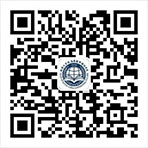
From April 22 to 24, 2021,the 18th Annual Conference on the Discipline Construction of Diplomacy in China themed 'the Discipline of Diplomacy and China's Diplomacy in the Post-Covid Era' was grandly in Tongji University. The conference was co-hosted by China Foreign Affairs University and Tongji University, organized by the Institute for China & World Studies and the School of Political Science & International Relations, Tongji University, and co-organized by Shanghai Society of International Relations, China Centre for International Science and Technology Exchange (CISTE), and Sichuan University.

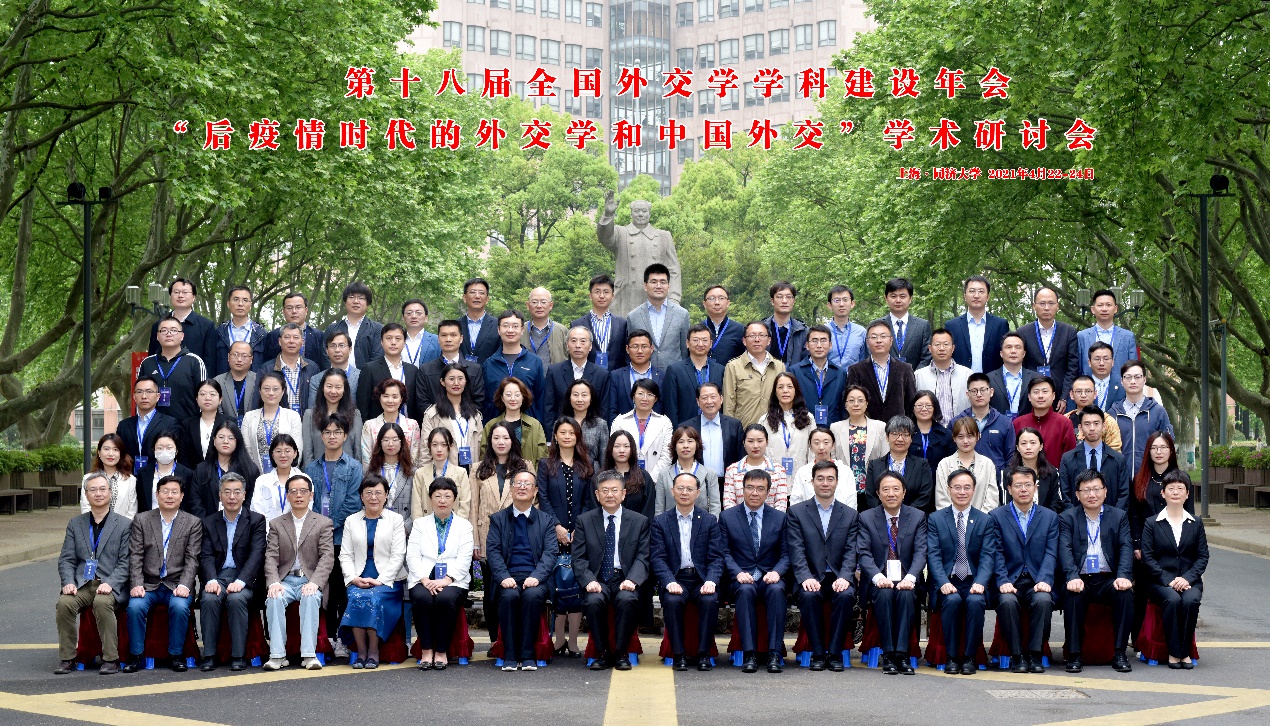
Nearly 100experts and scholars from the Ministry of Foreign Affairs, China Foreign Affairs University, China Institute of International Studies (CIIS), Peking University, Tsinghua University, Fudan University, Tongji University, Jilin University, Wuhan University, Nankai University, Beijing Normal University, Sichuan University, Shandong University, Lanzhou University, China University of Political Science and Law (CUPL), Shanghai International Studies University, Shanghai Academy of Social Sciences, Shanghai Institutes for International Studies (SIIS), National University of Defense Technology (NUDT), Jinan University, Central China Normal University (CCNU), Zhejiang Normal University (ZJNU), and China Centre for International Science and Technology Exchange (CISTE) gathered at Siping campus of Tongji University to discuss about the research on China's diplomatic theory and practice in the post-Covid era around the theme of 'the Discipline of Diplomacy and China's Diplomacy in the Post-Covid Era'. The meeting was held to encourage domestic academia to engage in mutual learning and cooperation for disciplinary development, and pool academic consensus and ideological wisdom on the development of China's diplomacy in the new era.
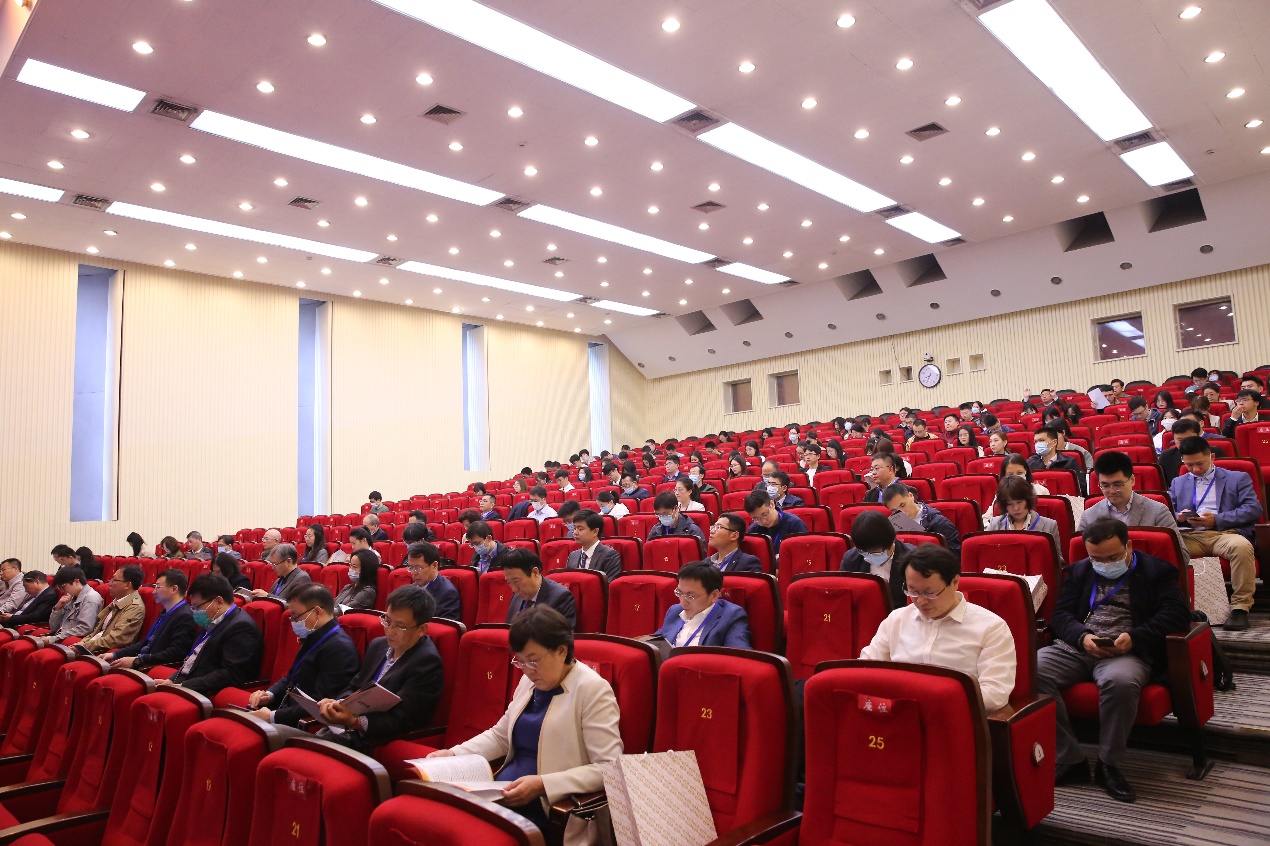
On the morning of April 23, 2021, the opening ceremony of the conference was held in the Lecture Hall on the first floor of Yifu Building, Tongji University. Professor Feng Shenhong, Executive Deputy Secretary of the Party Committee of Tongji University, Professor Xu Jian, President of CFAU, and Professor Yang Jiemian, President of Shanghai Society of International Relations and Chairman of the Academic Affairs Council of SIIS, attended and addressed the opening ceremony. Professor Men Honghua, President of the Institute for China & World Studies and Dean of the School of Political Science & International Relations, Tongji University, moderated the opening ceremony.
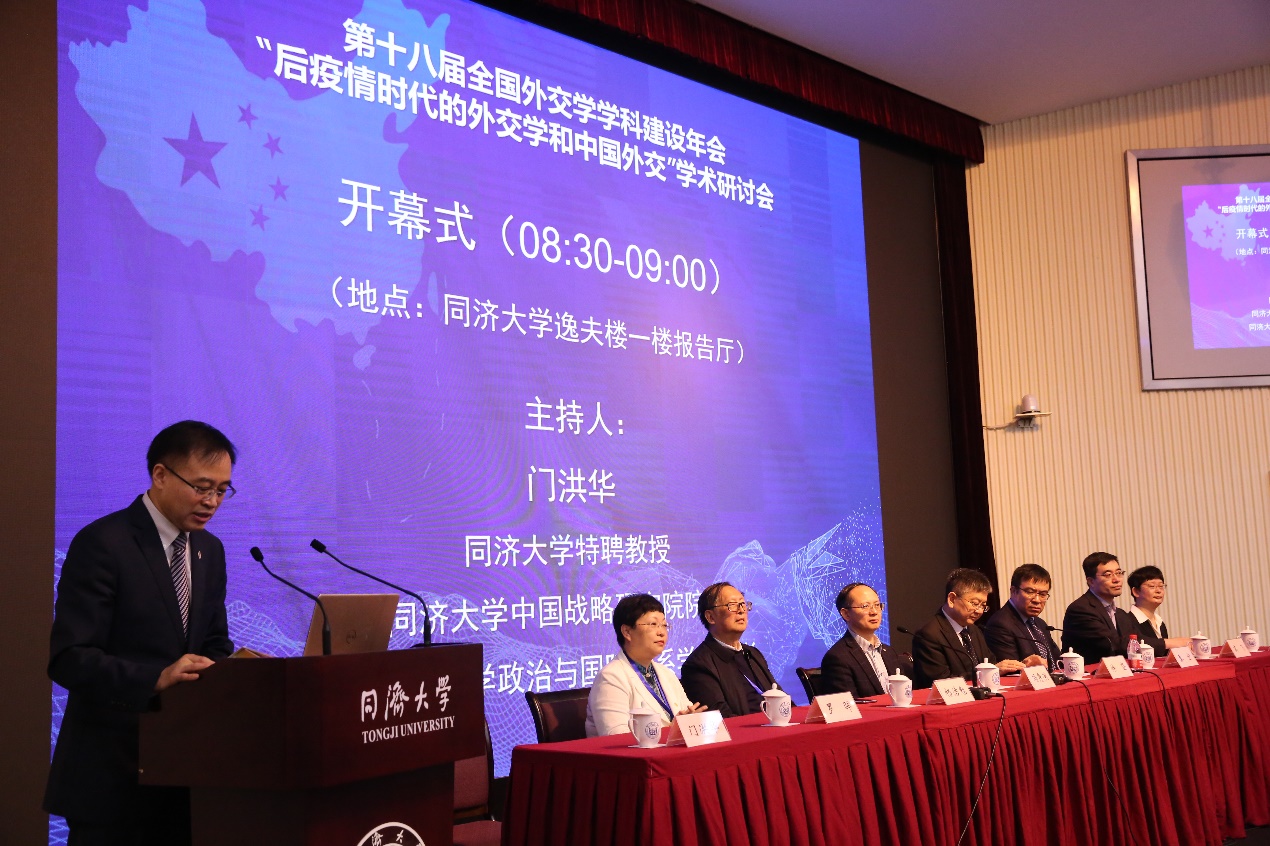
Secretary Feng Shenhong, on behalf of Tongji University, first extended his congratulations on the opening of this conference and expressed his sincere welcome and heartfelt thanks to all the experts and scholars present. He introduced that Tongji University boasts a consistent adherence to the fine tradition of “growing with the motherland and benefiting mankind with science and education”, always linking its own development with the national destiny and standing at the forefront of China's engagement with the world. With rapid development in recent years, the School of Political Science & International Relations has led the development of the new humanities in Tongji and a key platform for the internationalization of education in the university. In the current context of the emergence of profound changes unseen in a century and the unprecedented pandemic in the last century, the world has been hit on all fronts with an increasingly complex international environment, obviously fiercer competition among major powers, and the far-reaching Covid-19. Our plant has entered into an era of upheaval and change, and the development of major country relations is faced with numerous challenges. In this case, we shall think anew, study and propose ways to better cope with these risks and challenges, and provide strong intellectual support for tackling the key and thorny diplomatic issues.
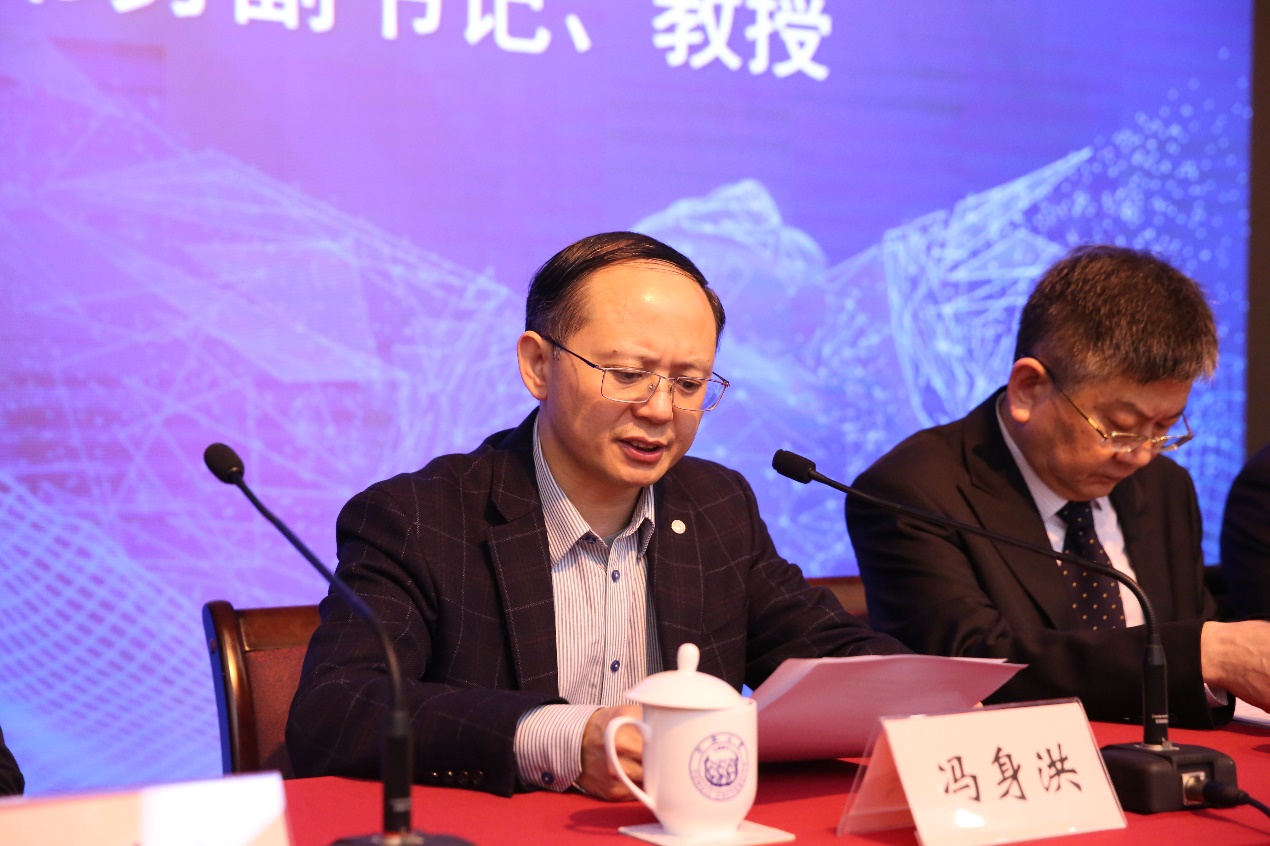
Secretary Feng stressed the necessity of further studies to comprehend the Xi Jinping Thought on Diplomacy. He expected fellow experts and scholars to jointly promote disciplinary development and contribute wisdom for this promising new era. He proposed to strengthen mutual cooperation and share research experience with each other to build a close academic community. Tongji University is ready to work with all those present to contribute wisdom and strength to the development of China's diplomacy and the discipline of diplomacy.
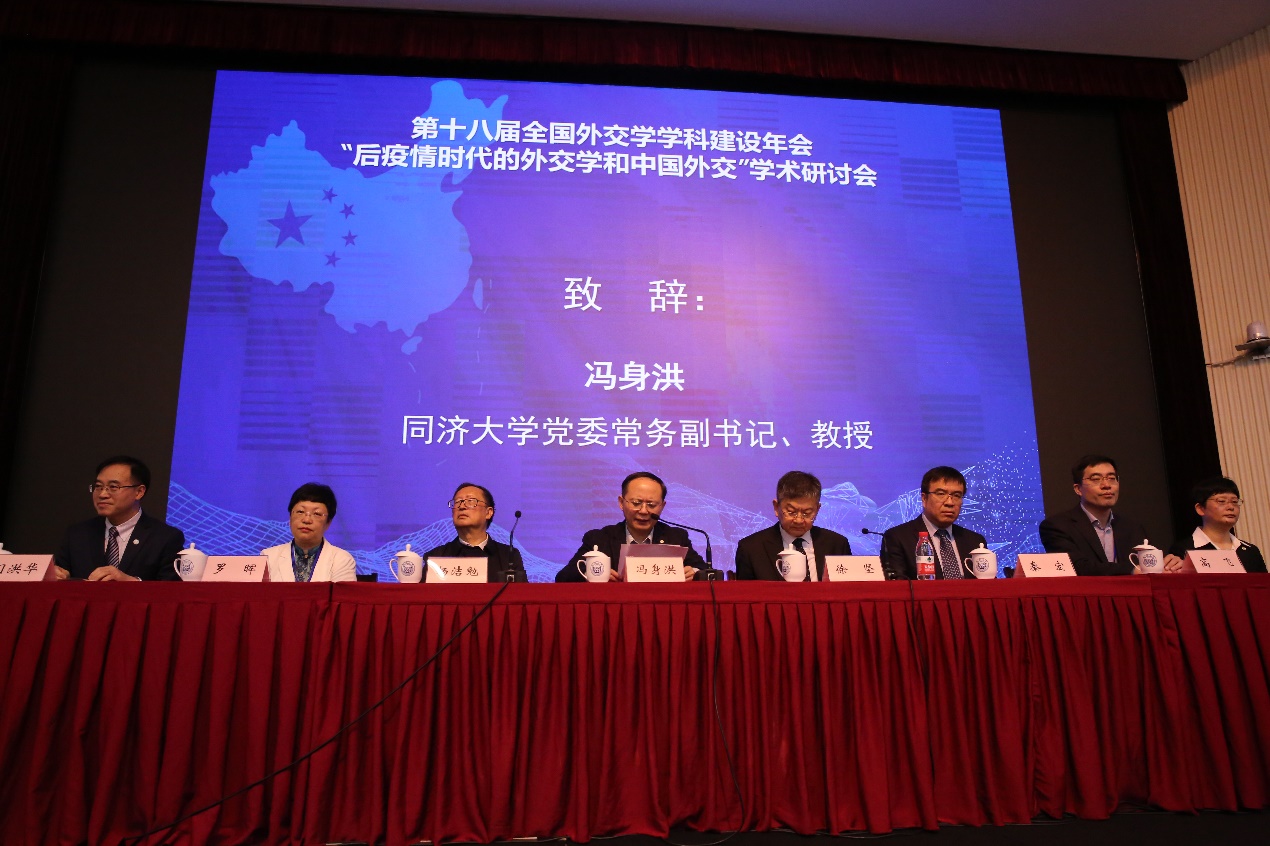
On behalf of the conference host, CFAU President Professor Xu Jian extended a warm welcome to the experts and scholars present. As revealed by Professor Xu, the profound changes unseen in a century are urging us to strengthen the cultivation of top-notch diplomacy talents to serve China’s diplomacy as a major power. Tongji is a university with a long and glory history, and its School of Political Science & International Relations has developed rapidly and made outstanding achievements in diplomatic studies. This annual conference held in Tongji is a grand event for all engaged in the studies of diplomacy after the outbreak of Covid-19. As stressed by President Xu, the world is now undergoing the greatest changes in a century, which has given rise to complicated diplomatic issues; under this scenario, we need to strengthen the studies of diplomacy, especially the cultivation of diplomatic talents, so as to promote the major country diplomacy with Chinese characteristics and cultivate more top-notch diplomatic and foreign affairs talents. As it is of special significance for this annual conference to be held on the occasion of the 100th anniversary of the founding of the Communist Party of China and the opening year of the 14th Five-Year Plan period, he encouraged all experts and scholars present to speak out freely and contribute their wisdom to the development of China's diplomacy.
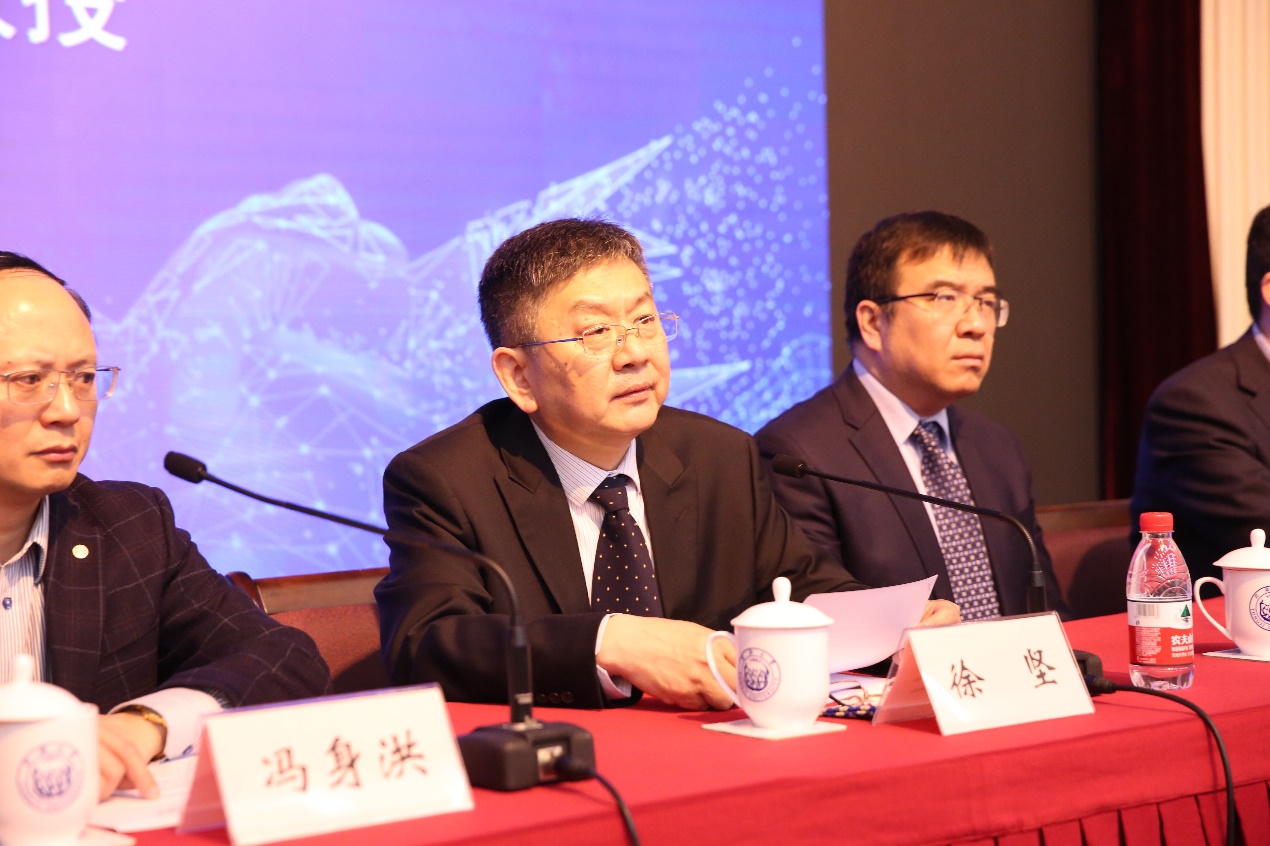
Professor Yang Jiemian, President of Shanghai Society of International Relations and Chairman of the Academic Affairs Council of SIIS, congratulated the convening of the conference in Tongji University, welcomed all scholars’ visit to Shanghai for academic exchanges, and wished a complete success of the conference. Professor Yang said that the discipline construction of diplomacy and the development of China's diplomacy shall rely on the Chinese ourselves. In this beautiful and pleasant springtime, we resumed the offline academic exchanges once interrupted by Covid-19. Such face-to-face exchanges can spark ideas and contribute to the development of the major country diplomacy with Chinese characteristics. Professor Yang hoped that the attendees may return with fruitful results like new understanding, achievements and ideas on diplomacy, continue to create new accomplishments, and make new friends with peer scholars.
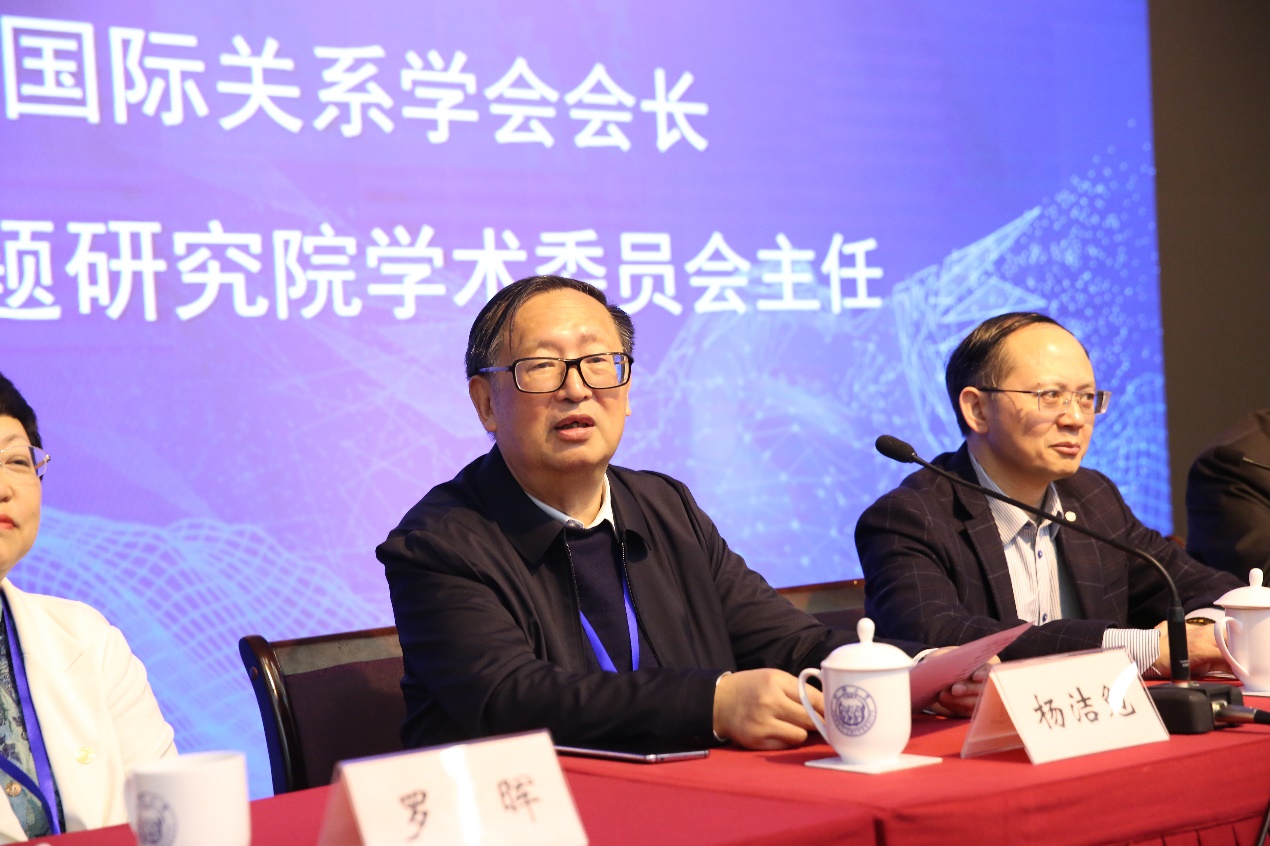
Then, Professor Yang Jiemian, Professor Xu Jian, Counsellor Qin Hong from Policy Planning Department, Ministry of Foreign Affairs, and Research Fellow Luo Hui, Director General of CISTE, delivered keynote speeches in the first session successively, which was moderated by Professor Gao Fei, Vice President of CFAU.
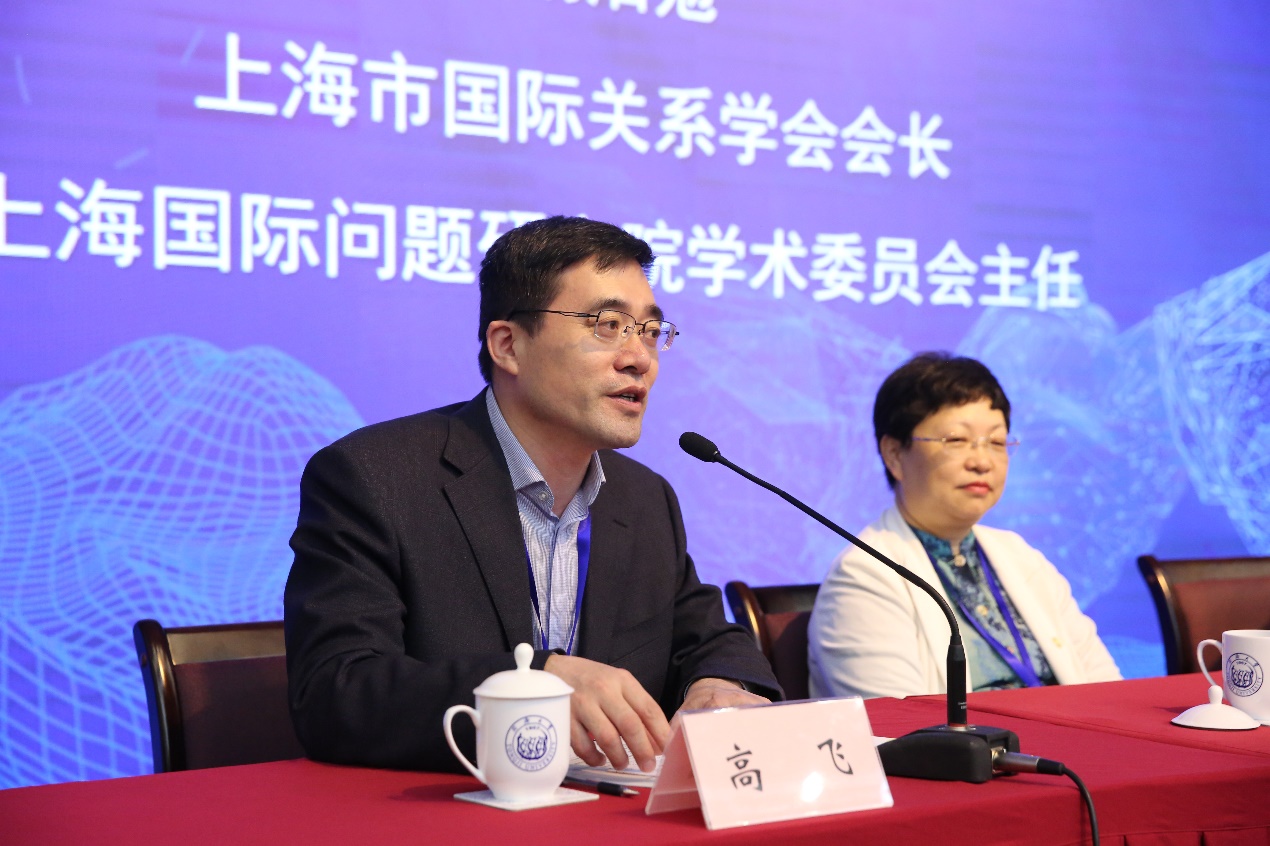
In the keynote speech 'Practical Characteristics, Historical Mission and Talent Training of China's Diplomacy Post Covid-19', Professor Yang Jiemian pointed out that China's diplomacy shall go with the consciousness of practice, the continuity of history and the echo of contemporary times; in addition, the diplomatic practice of China reflects the shift of international focus from West to East since the great discoveries of geography 500 years ago, and the profound changes unseen in a century are emerging. In his opinion, against this background, the development of China's diplomacy requires deep changes, namely, to adhere to a strong consciousness of practice and shoulder an important historical mission. Diplomacy shall not only be regarded as a discipline; instead, the theoretical worker of diplomacy shall also be a participant in practice, making contributions to China's diplomacy in the new era.

In the view of Professor Yang,China's diplomacy discipline shall cultivate interdisciplinary talents. In terms of diplomacy talent cultivation, to keep up with the needs of the times, we shall not only take foreign languages as the primary condition, but also take advantage of the scientific and technological progress and apply the technological achievements to the development of diplomacy, so as to make China's diplomacy more forward-looking. He called for the cultivation of interdisciplinary talents who can not only work in foreign-related departments, but also go abroad to provide international organizations and multinational companies with Chinese solutions and Chinese wisdom, so as to enhance China’s insight depth and say in the international stage.

President Xu Jian delivered a keynote speech titled 'The Development of Diplomacy Discipline and Talents Training amid the Centenary of CPC”. In the speech, he started with the relationship between the centenary of CPC and the development of the diplomacy discipline, and then summed up the following three new requirements for the diplomacy talents cultivation and discipline construction in the current international environment: firstly, more interdisciplinary diplomacy talents shall be cultivated in the wake of the sharp improvement in the quality and quantity of diplomacy talents; secondly, efforts shall be stepped up to transfer talents to international organizations, as the lack or the low level of Chinese diplomacy talents in international organizations for the time being negatively affects the development of China's say in international arena; thirdly, more diplomats for other countries shall be trained to enhance China’s regional influence.
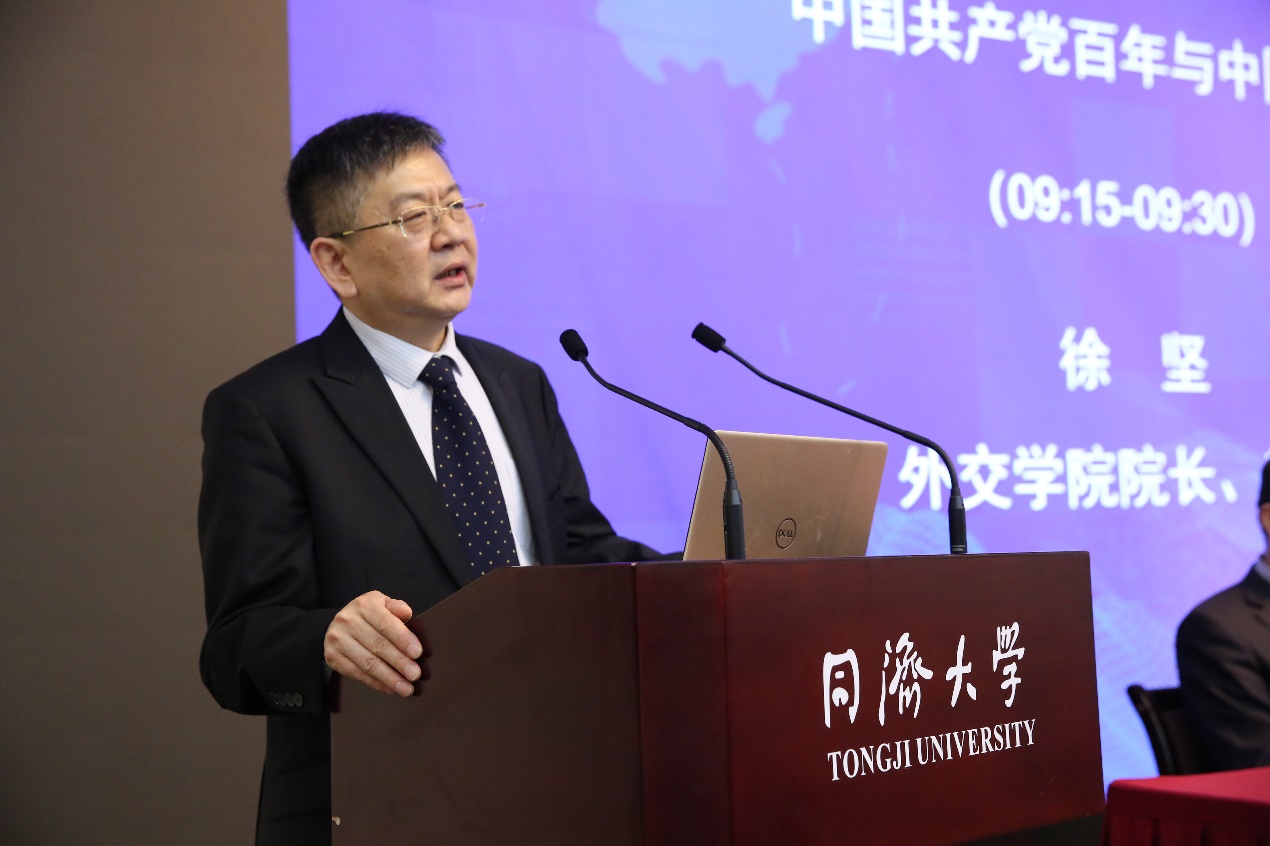
President Xu pointed out that in the future, the diplomacy shall be developed in line with three principles, namely, insisting on integrating theory with the up-to-date practice and keepping abreast of or even beyond the times, attaching importance to and encouraging the development of interdisciplinary disciplines, paying close attention to the international reality during talent training, and dynamically adjusting the curriculum system and training direction accordingly.
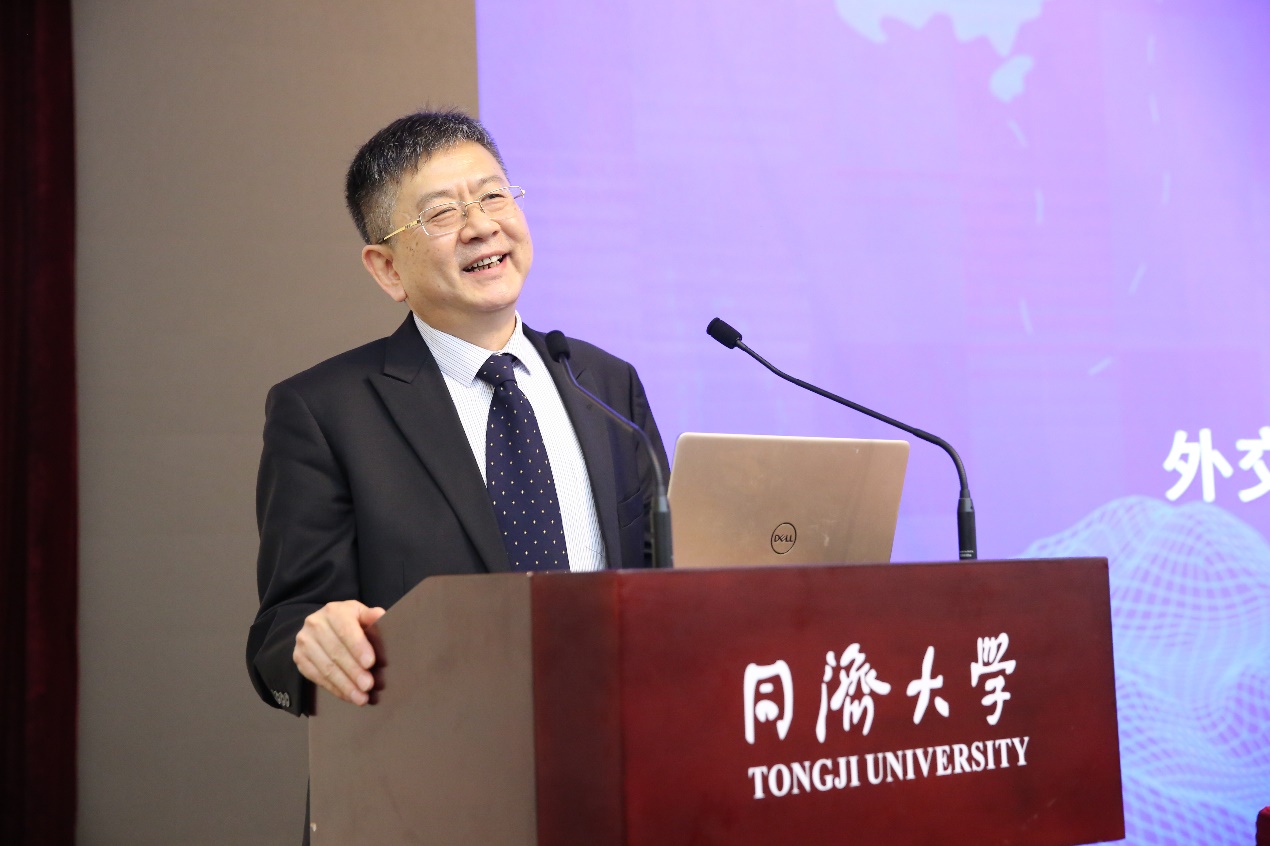
Counsellor Qin Hong delivered a keynote speech titled “Constantly Advancing the Innovation of Diplomatic Theories and Practices in the New Era under the Guidance of the Xi Jinping Thought on Diplomacy”. In the speech, Qin stressed the importance of taking the Xi Jinping Thought on Diplomacy as the research content and direction for the development of diplomacy discipline, so as to boost the innovation of diplomatic theories and practices in the new era.
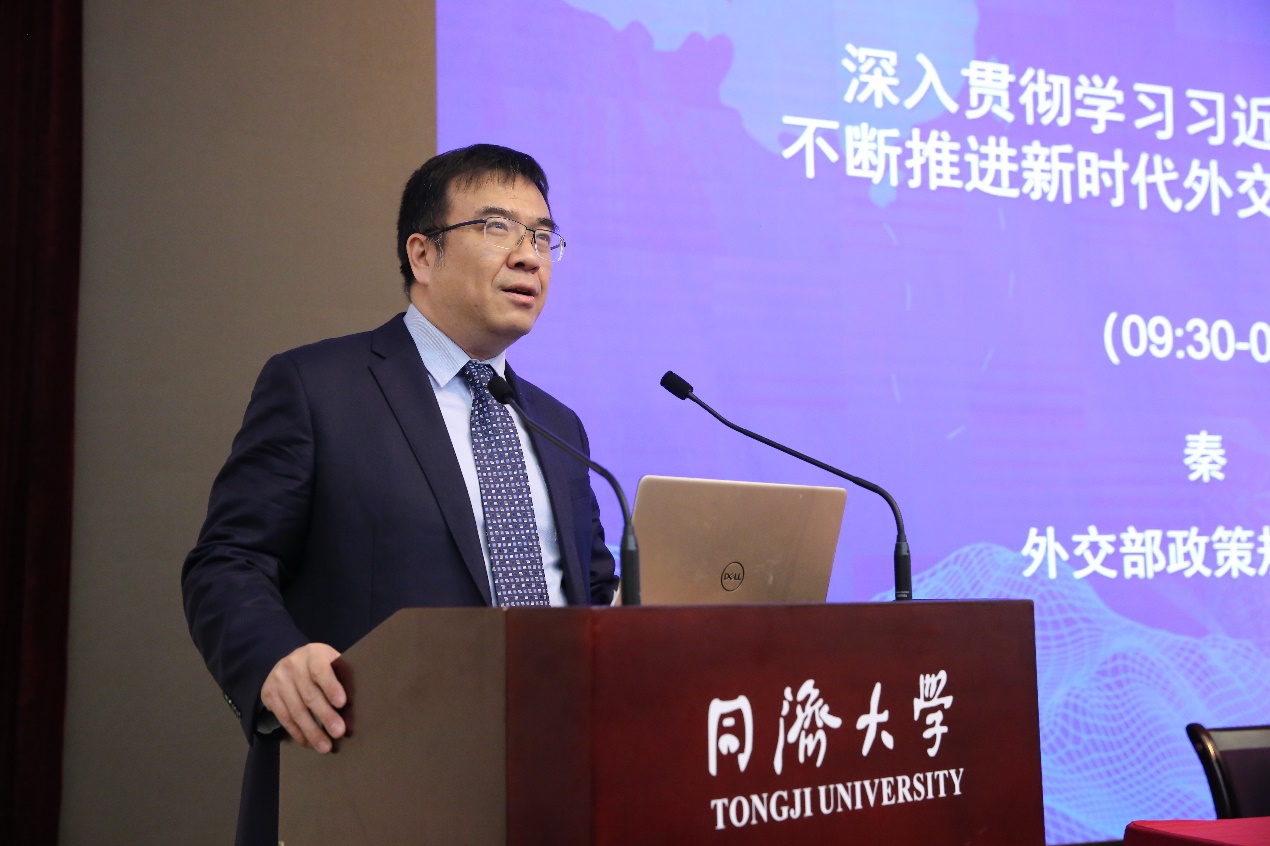
CISTE Director General Luo Hui made a keynote speech titled 'Some Thoughts on the Implementation of Technology-Based Diplomacy in the New Era', and put forward several ponders on the technology-based diplomacy in the new era from three dimensions, namely, the connotation and function of this diplomacy, the new changes of domestic and international environment faced by this diplomacy, and the practice of this diplomacy in the new era. She pointed out that technology plays an important role in promoting diplomacy and technological cooperation, and that the technology-based diplomacy is an important part and practical means of China's contemporary diplomacy. In her view, in faced of the new changes in the environment at home and abroad, the development of technology-based diplomacy shall follow the path of expanding the “circle of friends” in the international science and technology community with cooperation consensus, attracting scientists from all over the world to co-build and share an international cooperation platform, supporting Chinese scientists in participating deeply in global science and technology governance, providing public resources for science popularization and communication to promote mutual learning among civilizations, establishing a mechanism for scientific and people-to-people exchanges to pool strategic consensus, etc.
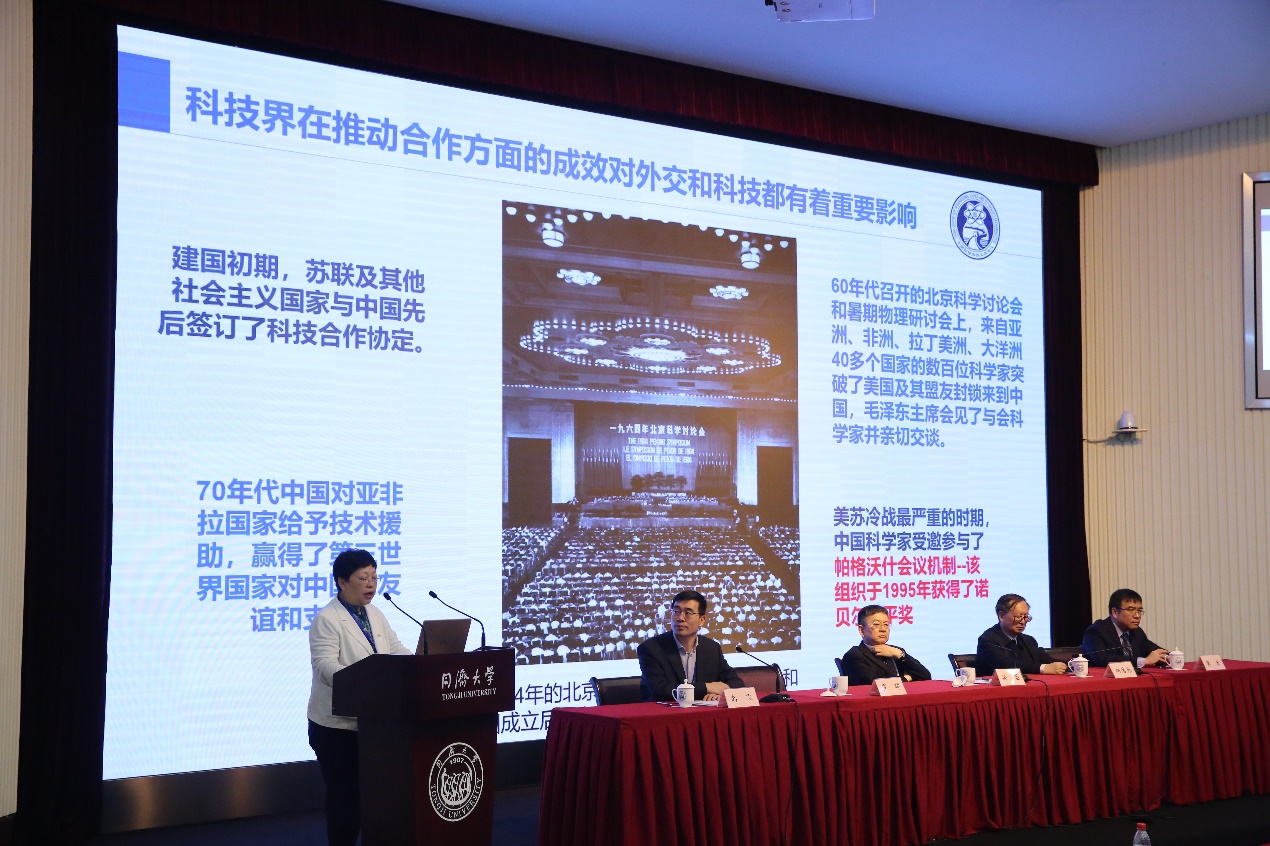
During the second session moderated by President Men Honghua, Professor Zhang Qingmin, Director of the Department of Diplomacy and Foreign Affairs Management, the School of International Studies, PKU, Professor Liu Hongwu, Director of the School of African Studies, ZJNU, Professor Zhao Kejin, Deputy Dean of the School of Humanities and Social Sciences, Tsinghua University, Professor Su Changhe, Dean of the School of International Relations and Public Affairs, FDU, and Professor Guo Shuyong, Dean of the School of International Relations and Public Affairs, SISU deliver keynote speeches.
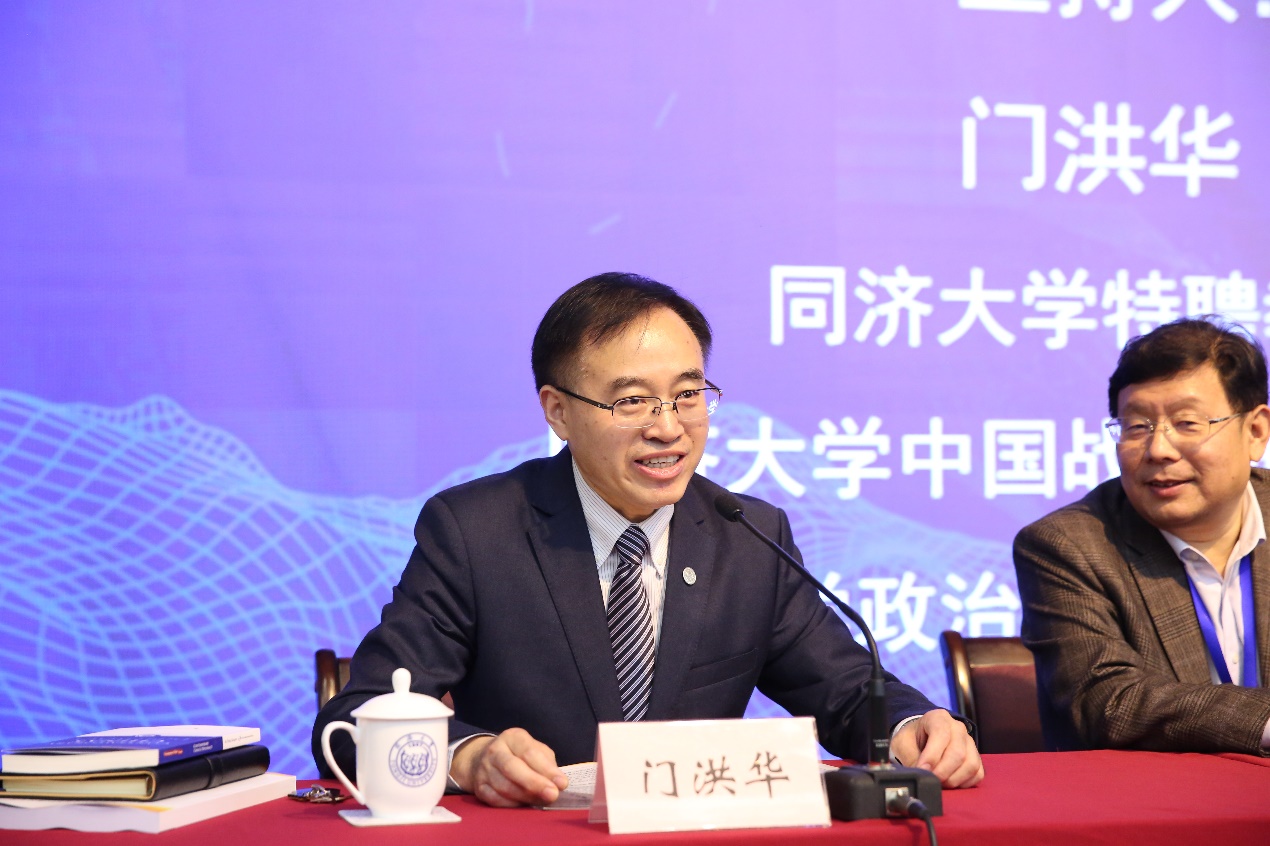
PKU Professor Zhang Qingmin delivered a keynote speech titled 'From Practical Guidance to Theoretical Construction: Progress and Achievements in Diplomacy Studies'. Starting from the new research findings in diplomacy in recent years, he expounded the stringency and independence of diplomacy studies as an independent discipline, and proposed the need to strengthen the theorization of diplomatic studies. In view of the status quo and future development of diplomacy studies in China, he proposed to correct the three paradoxes in diplomacy studies, namely, the paradox of 'generalization' and 'sanctification' of diplomacy studies, the paradox of “complete segmentation” or “confusion” of academic research and policy research, and the paradox of confusion of critique objects and learning objects, so as to gain a clear and accurate understanding of the diplomacy theories and develop diplomacy theories with Chinese characteristics.
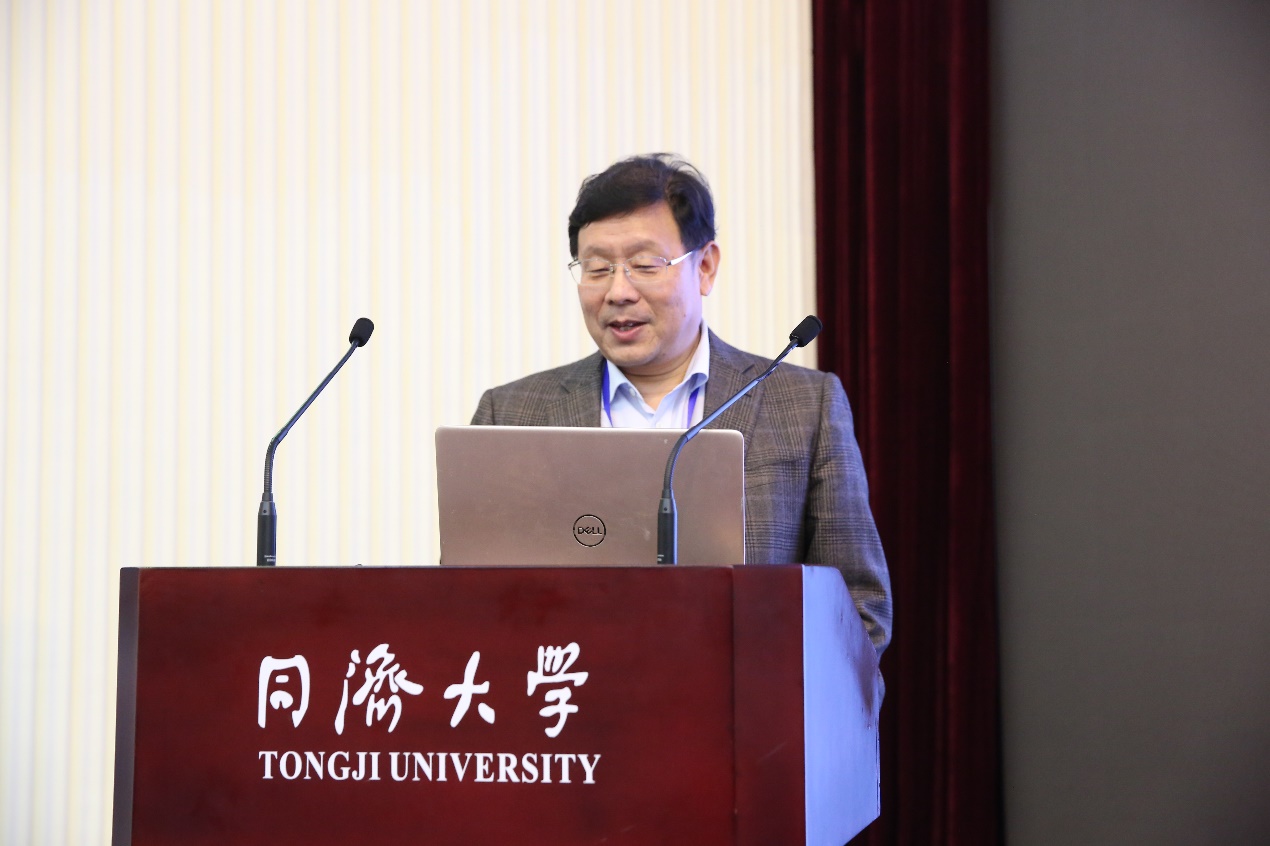
Professor Liu Hongwu, a distinguished professor under the Changjiang Scholars Program of MOE, and Director of the School of African Studies, ZJNU, gave a speech on 'The Foundation and Path of China's Diplomacy Discipline Construction from the Perspective of China's Aid Diplomacy to Africa'. As a well-known expert on China's diplomacy with Africa and African issues, Professor Liu talked in details about the relationship between interacting with Africa and shaping China's diplomatic spirit and character, the relationship between interacting with Africa and building China's diplomatic capacity, and the relationship between interacting with Africa and forming China's strategic pattern. He pointed out that the interaction with Africa helps to shape the spirit and character of China's diplomacy, build the image of China as a responsible power, enhance the construction of China's diplomatic capacity, and form China's strategic pattern. In his opinion, the diplomacy with Africa is a window and platform for the theoretical and practical observation of concept of “a community of shared future for mankind” proposed by China, and the Belt and Road Initiative is also an expanded version of the diplomatic success with Africa. He proposed to attach greater importance to the interaction with Africa as Sino-African cooperation and friendly relationship will act as the foundation for China's future strategic pattern.
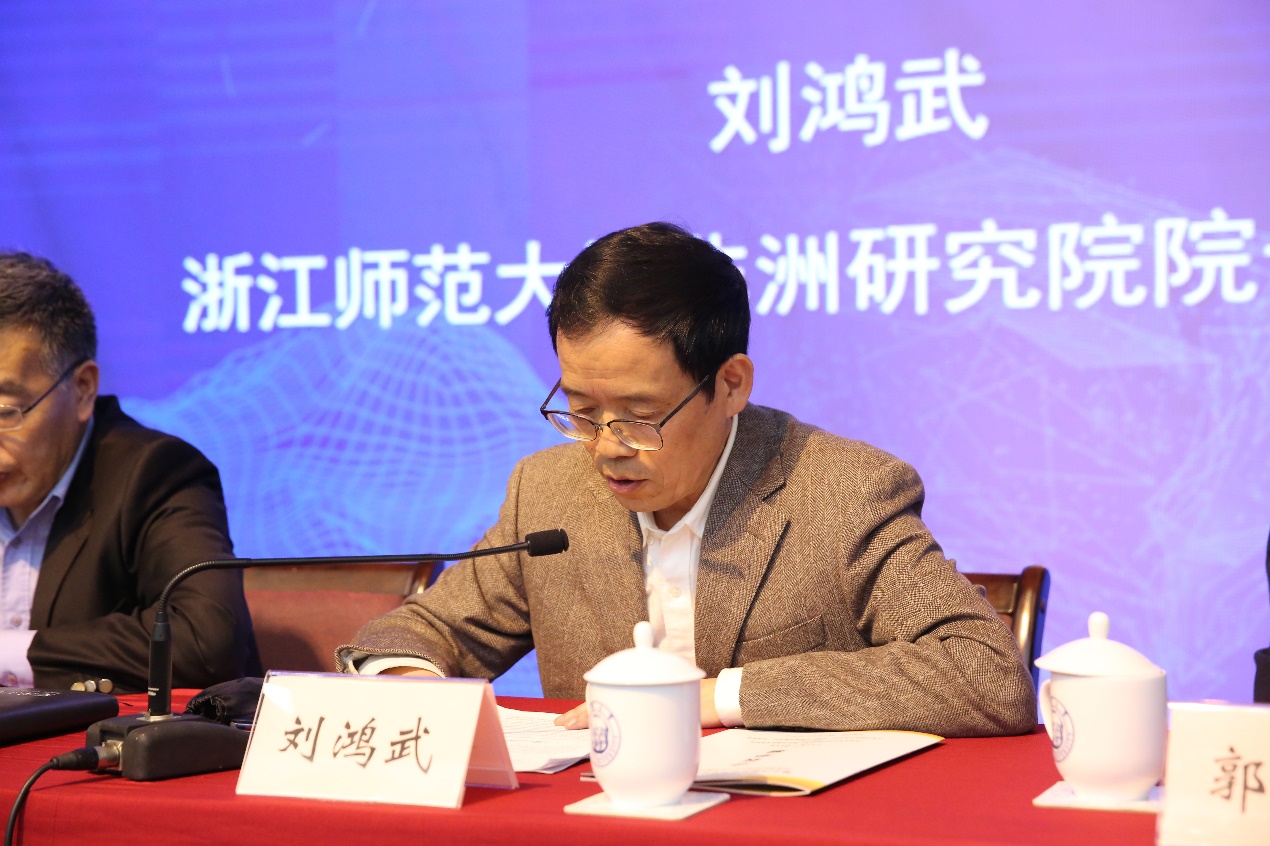
Professor Zhao Kejin, Deputy Dean of the School of Humanities and Social Sciences, Tsinghua University, made a speech on 'New Trends and New Ideas in the Discipline Construction of Diplomacy '. After a review of the historical development and evolution of diplomacy discipline, he put forward the idea that diplomacy is a process rather than a result. He held the opinion that as a multilateral, multi-level, multi-center and multi-field discipline, diplomacy is massively involved in both national policies and international systems, and the interaction among different levels and aspects shall be further enhanced. China needs to cultivate diplomacy talents who can look at the outside world from China and look at China from the outside world.
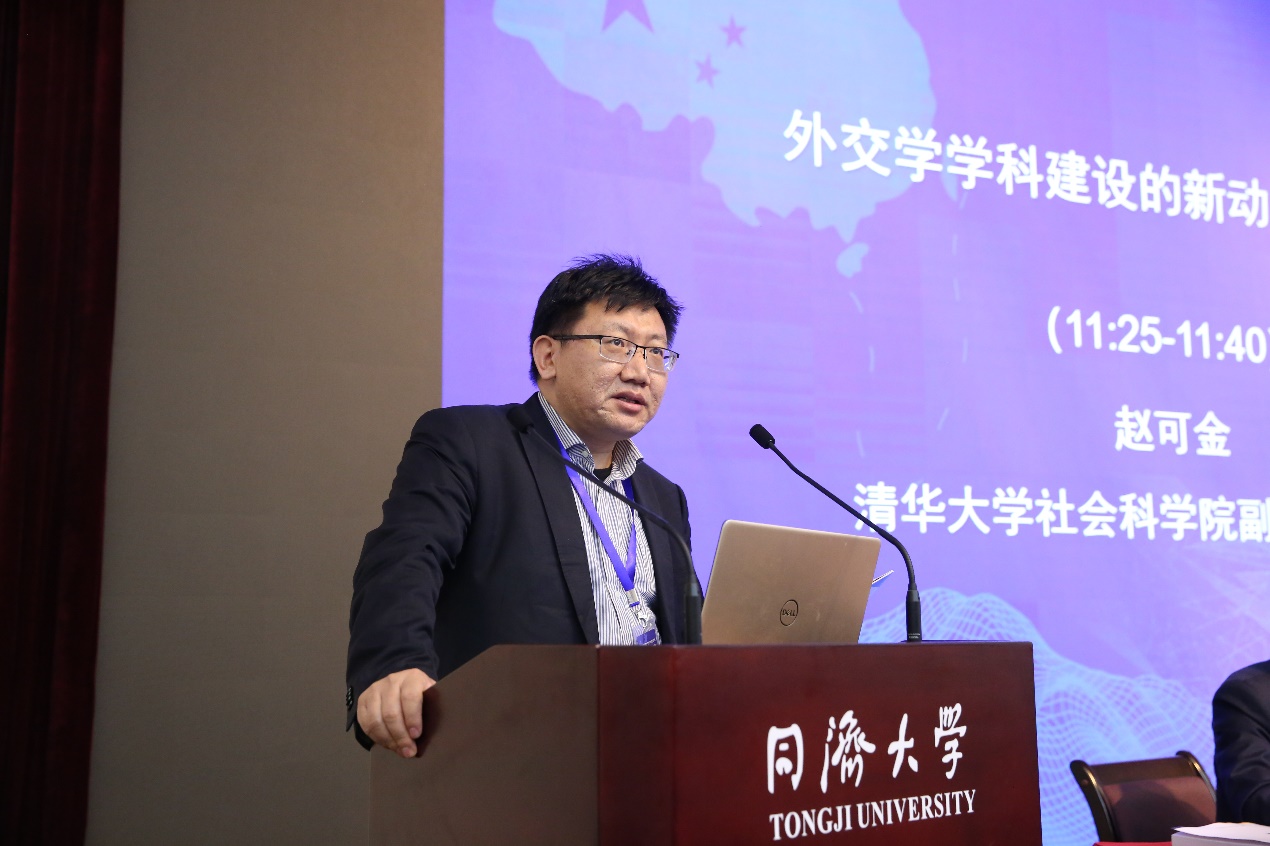
Professor Su Changhe, Dean of the School of International Relations and Public Affairs, FDU, delivered a keynote speech titled 'Sinicization of Diplomacy and Knowledge System of Chinese Diplomacy', holding the opinion that we shall build up Chinese diplomacy from China's own diplomatic thoughts and knowledge system developed in ancient China and stop the currently routine practice of using Western theories and discourses to describe and explain China's diplomacy, as the Western knowledge system is inappropriate for China.
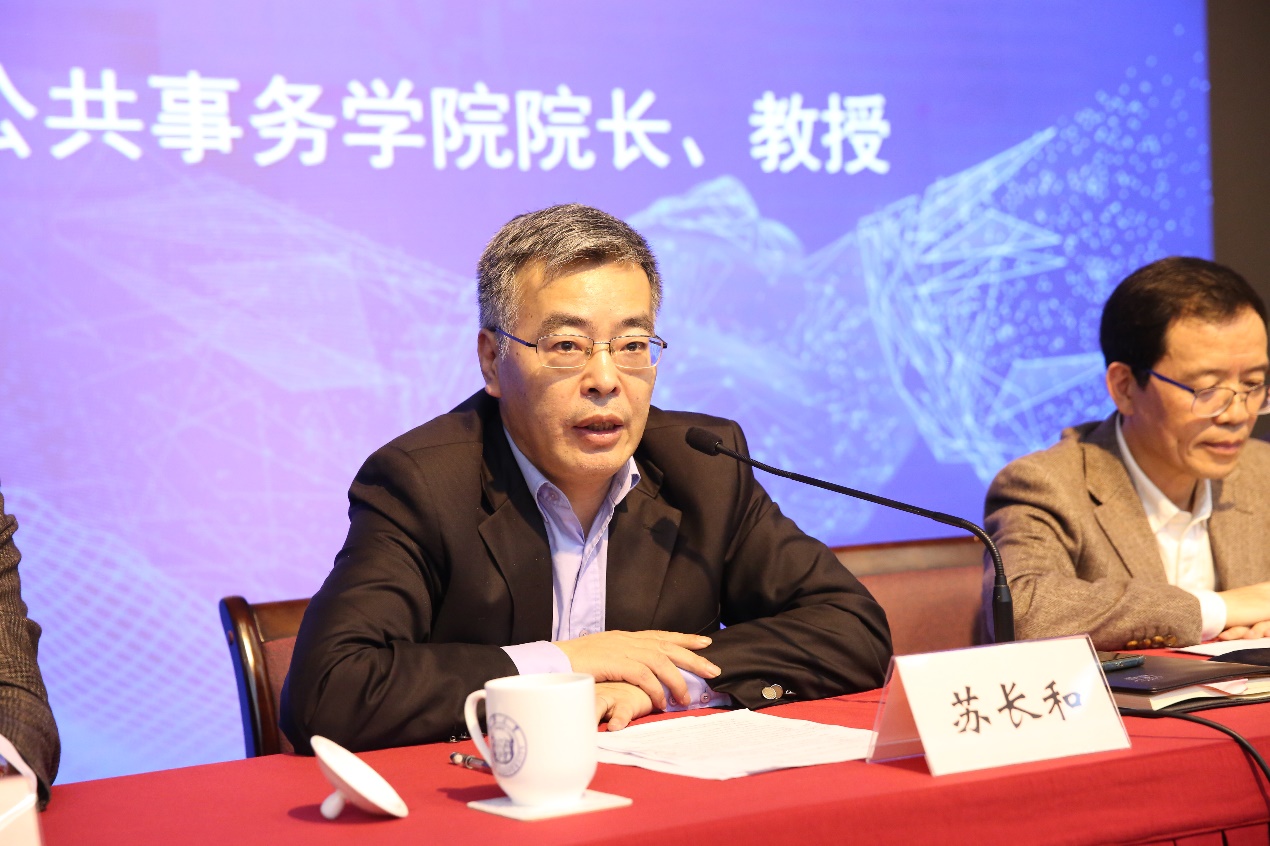
Professor Su believed that China's diplomacy shall be developed specifically by the following means, namely, realizing the Sinicization of diplomacy, and interpreting and internalizing Western diplomatic thoughts and theories in Chinese words rather than copying them mechanically; pooling resources such as the knowledge of modern diplomacy, the excellent traditional Chinese diplomatic resources, the road and theory of socialism with Chinese characteristics and the diplomatic practice since the establishment of the People's Republic of China to establish China's diplomatic knowledge system, with the logic of absorbing Chinese traditional diplomatic ideas and guiding the diplomatic practice with China's own 'orthodoxy'.

Professor Guo Shuyong, Dean of the School of International Relations and Public Affairs, SISU, delivered a keynote speech titled “Changes in the Global Governance Concept of the Communist Party of China”. In the speech, he proposed the view that the study of China's global governance concept shall start from the global governance concept of the CPC, because as the ruling party of China, the CPC's global governance concept plays a critical role in China's participation in global governance. Throughout the development history of the CPC since its founding, the CPC's global governance concept features rich ideas and connotations. Its emergence and change are measured by four important criteria, namely, the principle of international governance, the concept of international system, the concept of international justice, and the international responsibility and mission. Based on these four dimensions, the evolution of global governance concepts of the CPC since its founding can be divided into three stages. In the first stage related to 'world revolution', the CPC's global governance concept mainly focused on the socialist camp, and the development of the world revolution; in the second stage related to 'integrating into the international community', the global governance system of the West began to penetrate into the global governance concepts of the CPC which then focused on the construction of a new international political and economic order; in the third stage related to “leading global governance', the CPC's global governance concept is developing towards a positive posture in an all-round way, providing public goods in many fields, leading the institutional construction, and putting forward China’s solutions.
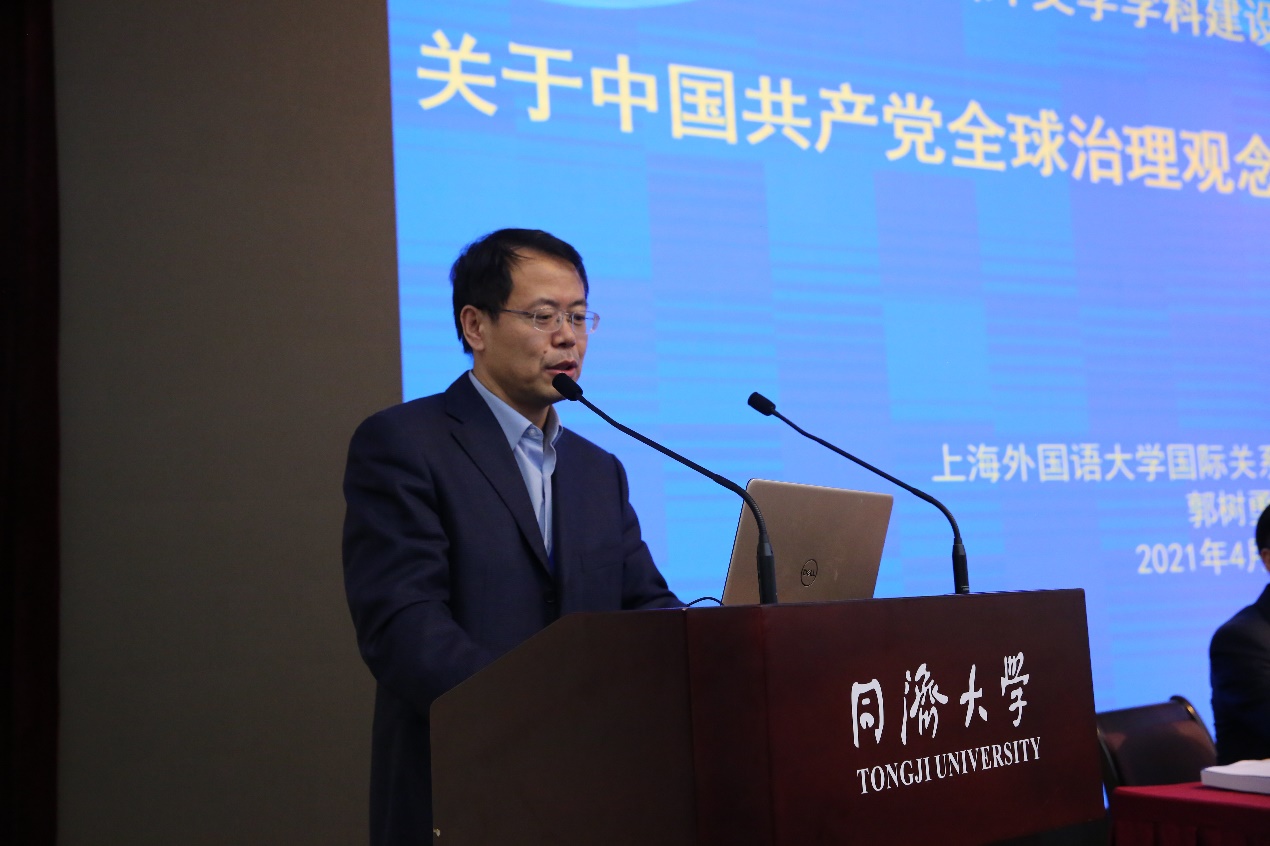
Finally, Professor Meng Honghua made a summary speech to the morning sessions. He briefly reviewed the speeches, commended the experts for giving such an academic feast in the thought and discipline construction of China's diplomacy and the specific diplomatic fields, and once again thanked all the experts present.
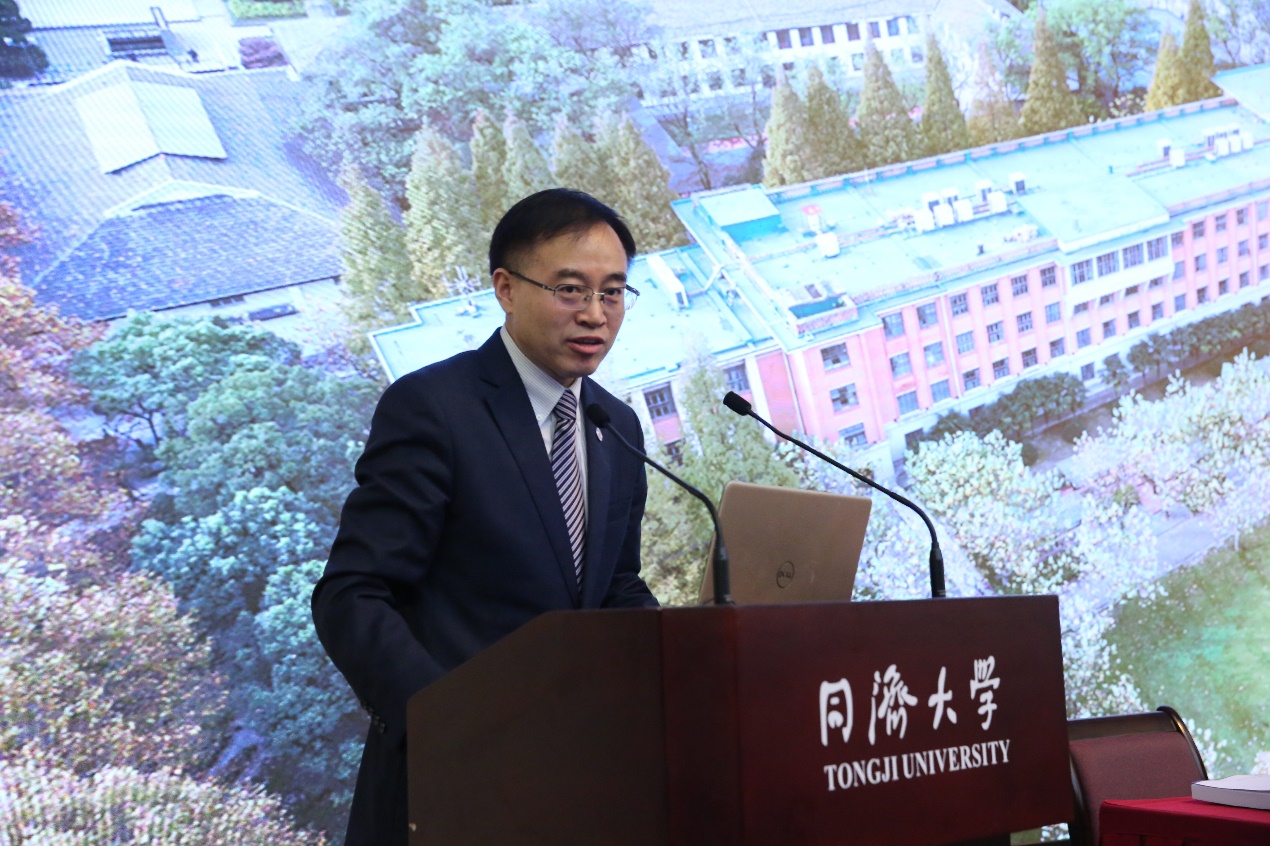
After the keynote speeches in the morning, the scholars, experts and guests attended the plenary meetings themed 'Frontiers of International Relations and Discipline Construction of Diplomacy' and 'Academic Journals, Discipline Development and Academic Community' to listen to experts' insights and jointly discuss about discipline development to push forward the construction of the academic community. In the three sub-sessions respectively themed “Major Country Diplomacy in the Post-Covid Era and the Belt and Road Initiative”, “Interaction between China and the World and New Development of Digital Diplomacy”, and 'Explorations on Diplomatic System and Diplomatic Decision-Making Mechanism', the experts each aired their own views, discussed and learned from each other, and contributed collective wisdom. Then, the 18th Annual Conference on the Discipline Construction of Diplomacy in China themed 'the Discipline of Diplomacy and China's Diplomacy in the Post-Covid Era' was successfully concluded.




